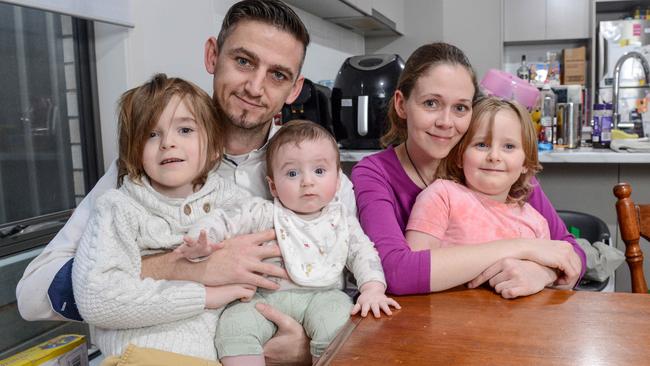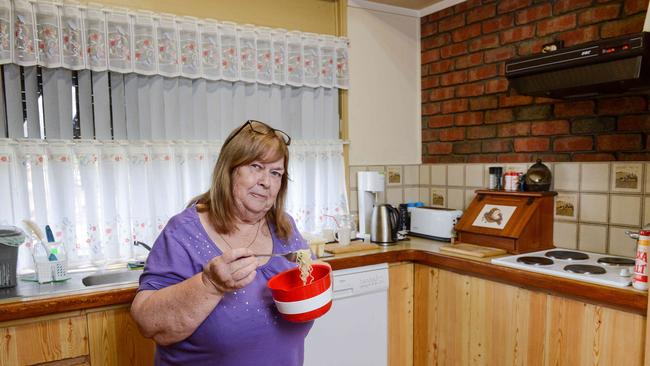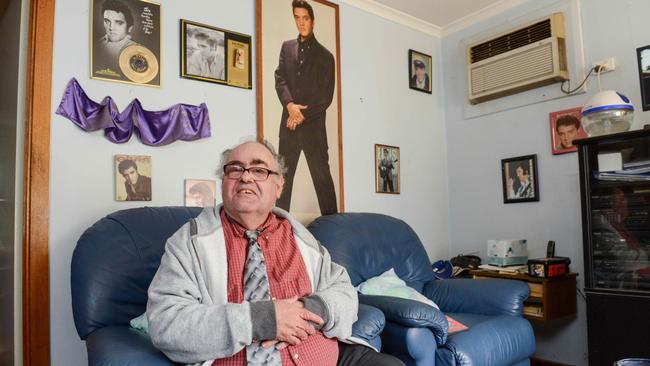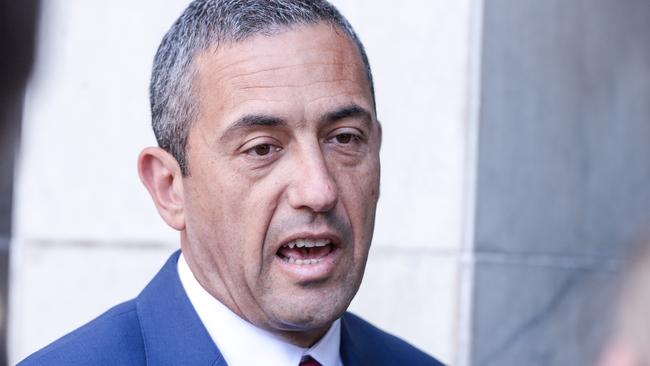Struggling SA families reveal what’s for dinner when bills eat up the budget
When even a tin of baked beans cost twice what it used to, many families feeling the pinch are now taking desperate measures.

SA News
Don't miss out on the headlines from SA News. Followed categories will be added to My News.
Balancing the household budget has become a matter of priorities for Seaford Heights couple Matthew King and Shae Pettigrew.
After their six-year-old twins and six-month-old son are fed each night, Mr King eats whatever is left over, while Ms Pettigrew has been living off baked beans in recent weeks.
“Even baked beans used to be $1 a tin and now it’s $5.90 for three tins. They’ve doubled in price,” she said.
“Even the cheap food, it’s not cheap anymore.”
Mr King, a freelance cabinet maker, and Ms Pettigrew, who worked in childcare before the birth of their youngest child, have switched to do much of their shopping at Aldi and NQR discount supermarket.
Like many families across Adelaide and South Australia, rising everyday costs combined with a tightening rental market have placed extreme pressure on their finances.
They started out paying $420/week for their three-bedroom home when they moved in at the beginning of last year, before the rent was raised to $440 at the end of their first 12-month lease.

They have recently been told the cost will rise again, this time to $480 — which Mr King and Ms Pettigrew have disputed with their agent and say they cannot pay.
That expense, and the skyrocketed cost of petrol, has forced them to look for a new home near Christies Beach, closer to the twins’ school.
“To take them and pick them up is about $10-15 in petrol,” she said.
“I’m trying to get them closer but, in the end, if we get a house that’s not close enough I’m going to have to change their school.
“I really wanted to keep that stable. With such uncertainty with our housing, you want something to stay continuous in their life.”
On the other side of the city, disability pensioner Harold Kinross, 59, has lived in the same Nailsworth housing trust unit for 28 years and agreed it’s never been more difficult to make ends meet.
Mr Kinross is battling stage two prostate cancer and receives regular treatment at the Royal Adelaide Hospital, but, even on the coldest winter days and nights, he never turns on the heating because of the cost of electricity.
“I’ll go upstairs and I’ll watch TV and cuddle up in bed,” he said.
“My body gets shivered sometimes.”

Even still, he said his power bills have increased by about $150 between the beginning of last year and now, despite his attempts to lower the cost by changing providers.
Mr Kinross said he receives about $933 each fortnight via the pension, before he pays $230 in rent and uses the remainder to cover his bills, food and occasional luxuries, such as a game of bowling or a karaoke session.
At Paralowie, north of the city, Lyn Wahlheim and her husband are paying off a mortgage but dealing with similar everyday financial pressures.
Their interest rate is currently fixed at 2.99 per cent until August, when it will shoot up in line with this week’s RBA decision to lift the cash rate target 50 basis points to 0.85 per cent.
Ms Wahlheim, 72, who receives a pension and cares for her double amputee husband, expected the rise would cost them an extra $70 a fortnight.
“I’m very concerned,” she said.
“When you’re already struggling on a fortnightly basis, you think ‘what are you going to do when it goes up?’”
Between the couple, one pension pays the mortgage, electricity and gas, and the other covers the Telstra bill, any other loans, fuel and car expenses and food.
Any unexpected costs, such as a recent roller shutters installation, Ms Wahlheim must pay for using buy now, pay later services like Afterpay and Humm.
On weeks when money is tight, it’s the food budget that takes a hit, with the couple sometimes spending as little as $100 on food each fortnight.
“Scrambled eggs on toast for dinner is one of the cheapest meals and we have that a lot,” she said.

“I don’t eat lunch normally but if I do it’s two minute noodles.”
Sitting at her kitchen table on Wednesday, Ms Wahlheim broke down in tears over the situation.
“There is no fun in life,” she said.
“I said to my sister the other day … this is not how I pictured retirement.”
South Australian Council of Social Service chief executive, Ross Womersley, said the rise in interest rates would most affect “households that are highly leveraged” and carrying multiple debts.
“These households may have been enticed in a low interest environment to taken on unmanageable levels of debt in a context where interest rates move up,” he said.
“In some instances they may have been encouraged to buy their way into home ownership with first homeowners’ incentive payments, only now to start to feel the inevitable pinch as mortgage and other interest rates start to creep upwards.”
Mr Womersley encouraged anyone challenged by debt levels to contact their lender directly, and said most will have hardship support policies in place.
Alternatively, anyone struggling with their finances can contact a free financial counsellor through the National Debt Helpline 1800 007 007.

Foot on the gas to keep the lights on
By Gabriel Polychronis
The energy market operator will be given new powers to store emergency gas supplies to prevent a repeat of the energy crisis that erupted last week, state and federal ministers have agreed.
In emergency crisis talks on Wednesday, the minsters also agreed to fast-track work on a new “capacity mechanism” that will incentivise investment in on-demand energy generators, with a focus on renewables.
SA Energy Minister Tom Koutsantonis revealed the state government would urgently pass new legislation next week to give the country’s energy regulator greater powers to monitor gas prices.
“(Now it will be) uniform, where every state will have transparent, open gas pricing market mechanisms … for the Australian energy regulator to look at and find out exactly what the contracts are worth to try to identify any behaviour that could be inappropriate,” he said.
“That legislation is in the parliament and we want to pass it next week as a matter of urgency through both houses.”
Stetting the stage for a political battle with the Opposition, Mr Koutsantonis accused the Marshall government of dragging its heels on the Bill while in power.
“The Marshall government had agreed to the legislation but not implemented because they wanted to derogate South Australia,” he said.
Following the meeting on Wednesday, federal Energy Minister Chris Bowen declared the ministers had “unanimously” agreed on “11 different pieces of action”.
“This meeting was never designed to solve all the problems in one go,” he said, warning there were “no silver bullets” or “magic answers”.
Mr Bowen said the Australian Energy Market Operator would be given the powers to procure and store gas in reserve to stave of supply crunches.
“Australians might be surprised to learn that power did not exist. (The operator) could not procure some gas and keep it in reserve to be released for urgent and crisis situations,” he said.
Mr Bowen also revealed the country’s energy ministers agreed to form a national plan to transition to renewable energy, in what he said would be seen “in time as a significant development”.
“The reason why we are in this crisis today is because there hasn’t been enough planning about the changes that are necessary,” he said.
He decried “not enough planning, not enough transmission investment and … more tries than Wally Lewis to get an energy policy”, referencing the legendary Australian rugby league player.
Mr Bowen said the Australian Energy Market Commission would release a new draft design of the capacity mechanism in coming days, with ministers pushing to implement it “as a matter of some urgency”. Pressed on whether it should support coal-fired power stations, Mr Bowen said he wanted it to prioritise new energy storage technology.
More Coverage
Originally published as Struggling SA families reveal what’s for dinner when bills eat up the budget





